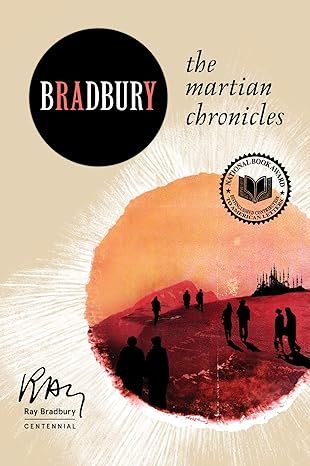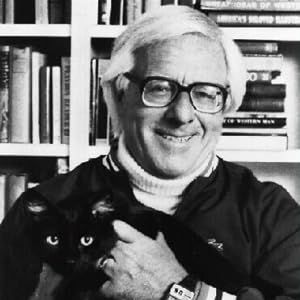The Martian ChroniclesPaperback
4.5
-
7,293 ratings
Mars was a distant shore, and the men spread upon it in waves... Each wave different, and each wave stronger.
The Martian Chronicles
Ray Bradbury is a storyteller without peer, a poet of the possible, and, indisputably, one of America's most beloved authors. In a much celebrated literary career that has spanned six decades, he has produced an astonishing body of work: unforgettable novels, including Fahrenheit 451 and Something Wicked This Way Comes; essays, theatrical works, screenplays and teleplays; The Illustrated Man, Dandelion Wine, The October Country, and numerous other superb short story collections. But of all the dazzling stars in the vast Bradbury universe, none shines more luminous than these masterful chronicles of Earth's settlement of the fourth world from the sun.
Bradbury's Mars is a place of hope, dreams and metaphor-of crystal pillars and fossil seas-where a fine dust settles on the great, empty cities of a silently destroyed civilization. It is here the invaders have come to despoil and commercialize, to grow and to learn -first a trickle, then a torrent, rushing from a world with no future toward a promise of tomorrow. The Earthman conquers Mars ... and then is conquered by it, lulled by dangerous lies of comfort and familiarity, and enchanted by the lingering glamour of an ancient, mysterious native race.
Ray Bradbury's The Martian Chronicles is a classic work of twentieth-century literature whose extraordinary power and imagination remain undimmed by time's passage. In connected, chronological stories, a true grandmaster once again enthralls, delights and challenges us with his vision and his heart-starkly and stunningly exposing in brilliant spacelight our strength, our weakness, our folly, and our poignant humanity on a strange and breathtaking world where humanity does not belong.
Read more
Kindle
$13.99
Available instantly
Audiobook
$0.99
with membership trial
Hardcover
$30.00
Paperback
$9.19
Ships from
Amazon.com
Payment
Secure transaction
ISBN-10
006207993X
ISBN-13
978-0062079930
Print length
288 pages
Language
English
Publisher
William Morrow Paperbacks
Publication date
October 10, 2011
Dimensions
0.7 x 5.32 x 8.02 inches
Item weight
2.31 pounds
Popular Highlights in this book
They blended religion and art and science because, at base, science is no more than an investigation of a miracle we can never explain, and art is an interpretation of that miracle.
Highlighted by 1,554 Kindle readers
We Earth Men have a talent for ruining big, beautiful things. The only reason we didn’t set up hot-dog stands in the midst of the Egyptian temple of Karnak is because it was out of the way and served no large commercial purpose.
Highlighted by 613 Kindle readers
Doesn’t an old thing always know when a new thing comes?
Highlighted by 606 Kindle readers
Product details
ASIN :
B00CKOQC9C
File size :
3500 KB
Text-to-speech :
Enabled
Screen reader :
Supported
Enhanced typesetting :
Enabled
X-Ray :
Not Enabled
Word wise :
Enabled
Editorial reviews
Review
“What has this man from Illinois done that episodes from the conquest of another planet leave me in terror and loneliness, I question, as I close the pages of his book. . . .In this book of phantasmagoric experiences, Bradbury has put his empty Sundays, his American boredom, his loneliness, just like Sinclair Lewis did in Main Street.” — Jorge Luis Borges“The Martian Chronicles was the first science fiction book to make me feel a character's righteous rage... and the first science fiction book to make me feel loss and loneliness in my gut, doing it without featuring a single human, save as a shadow on a wall... The Martian Chronicles, in short showed me what words can truly do. It showed me magic.” — John Scalzi“Mars in his hands...is not a place described with scientific accuracy or even much consistency, but a state of mind…. Space ships are not miracles of technology, but psychic conveyances, serving the same purpose as Dorothy's whirlwind-borne house in The Wonderful Wizard of Oz, or the trance of the traditional shaman: they get you to the Otherworld.” — Margaret Atwood“A prescient, lyrical writer with an abiding hatred for intolerance, Bradbury influenced generations of readers and many of our most famous dreamers, from Stephen King to Steven Spielberg.” — Junot Diaz“How I passed so much of my life without devouring everything Ray Bradbury has ever read is beyond me...on the bright side, how fortunate I am to experience all this for the first time! My God.” — R. F. Kuang
From the Inside Flap
Bradbury's Mars is a place of hope, dreams and metaphor - of crystal pillars and fossil seas - where a fine dust settles on the great, empty cities of a silently destroyed civilization. It is here the invaders have come to despoil and commercialize, to grow and to learn - first a trickle, then a torrent, rushing from a world with no future toward a promise of tomorrow. The Earthman conquers Mars...and then is conquered by it, lulled by dangerous lies of comfort and familiarity, and enchanted by the lingering glamour of an ancient, mysterious native race.
From the Back Cover
Mars was a distant shore, and the men spread upon it in waves. Each wave different, and each wave stronger. Ray Bradbury is a storyteller without peer, a poet of the possible, and, indisputably, one of America’s most beloved authors. The Mars he imagines in these masterful chronicles is a place of hope, dreams, and metaphor—of crystal pillars and fossil seas—where a fine dust settles on the great, empty cities of a silently destroyed civilization. Bradbury’s The Martian Chronicles is a classic work of twentieth-century literature whose extraordinary power and imagination remain undimmed by time’s passage. In connected, chronological stories, a true grand master once again enthralls, delights, and challenges us with his vision and heart—starkly exposing in brilliant spacelight our strength, weakness, folly, and poignant humanity in a strange and breathtaking world where humanity does not belong.
About the Author
In a career spanning more than seventy years, Ray Bradbury inspired generations of readers to dream, think, and create. A prolific author of hundreds of short stories and close to fifty books, as well as numerous poems, essays, operas, plays, and screenplays, Bradbury was one of the most celebrated writers of our time. His groundbreaking works include Fahrenheit 451, The Martian Chronicles, The Illustrated Man, Dandelion Wine, and Something Wicked This Way Comes. An Emmy Award winner for his teleplay The Halloween Tree and an Academy Award nominee, he was the recipient of the 2000 National Book Foundation Medal for Distinguished Contribution to American Letters, the 2004 National Medal of Arts, and the 2007 Pulitzer Prize Special Citation, among many honors.
Read more
Sample
Excerpt. © Reprinted by permission. All rights reserved.
January 1999: Rocket Summer
One minute it was Ohio winter, with doors closed, windows locked, the panes blind with frost, icicles fringing every roof, children skiing on slopes, housewives lumbering like great black bears in their furs along the icy streets.
And then a long wave of warmth crossed the small town. A flooding sea of hot air; it seemed as if someone had left a bakery door open. The heat pulsed among the cottages and bushes and children. The icicles dropped, shattering, to melt. The doors flew open. The windows flew up. The children worked off their wool clothes. The housewives shed their bear disguises. The snow dissolved and showed last summer's ancient green lawns.
Rocket summer. The words passed among the people in the open, airing houses. Rocket summer. The warm desert air changing the frost patterns on the windows, erasing the art work. The skis and sleds suddenly useless. The snow, falling from the cold sky upon the town, turned to a hot rain before it touched the ground.
Rocket summer. People leaned from their dripping porches and watched the reddening sky.
The rocket lay on the launching field, blowing out pink clouds of fire and oven heat. The rocket stood in the cold winter morning, making summer with every breath of its mighty exhausts. The rocket made climates, and summer lay for a brief moment upon the land. . . .
February 1999: Ylla
They had a house of crystal pillars on the planet Mars by the edge of an empty sea, and every morning you could see Mrs. K eating the golden fruits that grew from the crystal walls, or cleaning the house with handfuls of magnetic dust which, taking all dirt with it, blew away on the hot wind. Afternoons, when the fossil sea was warm and motionless, and the wine trees stood stiff in the yard, and the little distant Martian bone town was all enclosed, and no one drifted out their doors, you could see Mr. K himself in his room, reading from a metal book with raised hieroglyphs over which he brushed his hand, as one might play a harp. And from the book, as his fingers stroked, a voice sang, a soft ancient voice, which told tales of when the sea was red steam on the shore and ancient men had carried clouds of metal insects and electric spiders into battle.
Mr. and Mrs. K had lived by the dead sea for twenty years, and their ancestors had lived in the same house, which turned and followed the sun, flower-like, for ten centuries.
Mr. and Mrs. K were not old. They had the fair, brownish skin of the true Martian, the yellow coin eyes, the soft musical voices. Once they had liked painting pictures with chemical fire, swimming in the canals in the seasons when the wine trees filled them with green liquors, and talking into the dawn together by the blue phosphorous portraits in the speaking room.
They were not happy now.
This morning Mrs. K stood between the pillars, listening to the desert sands heat, melt into yellow wax, and seemingly run on the horizon.
Something was going to happen.
She waited.
She watched the blue sky of Mars as if it might at any moment grip in on itself, contract, and expel a shining miracle down upon the sand.
Nothing happened.
Tired of waiting, she walked through the misting pillars. A gentle rain sprang from the fluted pillar tops, cooling the scorched air, falling gently on her. On hot days it was like walking in a creek. The floors of the house glittered with cool streams. In the distance she heard her husband playing his book steadily, his fingers never tired of the old songs. Quietly she wished he might one day again spend as much time holding and touching her like a little harp as he did his incredible books.
But no. She shook her head, an imperceptible, forgiving shrug. Her eyelids closed softly down upon her golden eyes. Marriage made people old and familiar, while still young.
She lay back in a chair that moved to take her shape even as she moved. She closed her eyes tightly and nervously.
The dream occurred.
Her brown fingers trembled, came up, grasped at the air. A moment later she sat up, startled, gasping.
She glanced about swiftly, as if expecting someone there before her. She seemed disappointed; the space between the pillars was empty.
Her husband appeared in a triangular door. "Did you call?" he asked irritably.
"No!" she cried.
"I thought I heard you cry out."
"Did I? I was almost asleep and had a dream!"
"In the daytime? You don't often do that."
She sat as if struck in the face by the dream. "How strange, how very strange," she murmured. "The dream."
"Oh?" He evidently wished to return to his book.
"I dreamed about a man."
"A man?"
"A tall man, six feet one inch tall."
"How absurd; a giant, a misshapen giant."
"Somehow"--she tried the words--"he looked all right. In spite of being tall. And he had--oh, I know you'll think it silly--he had blue eyes!"
"Blue eyes! Gods!" cried Mr. K. "What'll you dream next? I suppose he had black hair?"
"How did you guess?" She was excited.
"I picked the most unlikely color," he replied coldly.
"Well, black it was!" she cried. "And he had a very white skin; oh, he was most unusual! He was dressed in a strange uniform and he came down out of the sky and spoke pleasantly to me." She smiled.
"Out of the sky; what nonsense!"
"He came in a metal thing that glittered in the sun," she remembered. She closed her eyes to shape it again. "I dreamed there was the sky and something sparkled like a coin thrown into the air, and suddenly it grew large and fell down softly to land, a long silver craft, round and alien. And a door opened in the side of the silver object and this tall man stepped out."
"If you worked harder you wouldn't have these silly dreams."
"I rather enjoyed it," she replied, lying back. "I never suspected myself of such an imagination. Black hair, blue eyes, and white skin! What a strange man, and yet--quite handsome."
"Wishful thinking."
"You're unkind. I didn't think him up on purpose; he just came in my mind while I drowsed. It wasn't like a dream. It was so unexpected and different. He looked at me and he said, 'I've come from the third planet in my ship. My name is Nathaniel York----' "
"A stupid name; it's no name at all," objected the husband.
"Of course it's stupid, because it's a dream," she explained softly. "And he said, 'This is the first trip across space. There are only two of us in our ship, myself and my friend Bert.' "
"Another stupid name."
"And he said, 'We're from a city on Earth; that's the name of our planet,' " continued Mrs. K. "That's what he said. 'Earth' was the name he spoke. And he used another language. Somehow I understood him. With my mind. Telepathy, I suppose."
Mr. K turned away. She stopped him with a word. "Yll?" she called quietly. "Do you ever wonder if--well, if there are people living on the third planet?"
"The third planet is incapable of supporting life," stated the husband patiently. "Our scientists have said there's far too much oxygen in their atmosphere."
"But wouldn't it be fascinating if there were people? And they traveled through space in some sort of ship?"
"Really, Ylla, you know how I hate this emotional wailing. Let's get on with our work."
It was late in the day when she began singing the song as she moved among the whispering pillars of rain. She sang it over and over again.
"What's that song?" snapped her husband at last, walking in to sit at the fire table.
"I don't know." She looked up, surprised at herself. She put her hand to her mouth, unbelieving. The sun was setting. The house was closing itself in, like a giant flower, with the passing of light. A wind blew among the pillars; the fire table
bubbled its fierce pool of silver lava. The wind stirred her russet hair, crooning softly in her ears. She stood silently looking out into the great sallow distances of sea bottom, as if recalling something, her yellow eyes soft and moist. " 'Drink to me only with thine eyes, and I will pledge with mine,' " she sang, softly, quietly, slowly. " 'Or leave a kiss within the cup, and I'll not ask for wine.' " She hummed now, moving her hands in the wind ever so lightly, her eyes shut. She finished the song.
It was very beautiful.
"Never heard that song before. Did you compose it?" he inquired, his eyes sharp.
"No. Yes. No, I don't know, really!" She hesitated wildly. "I don't even know what the words are; they're another language!"
"What language?"
She dropped portions of meat numbly into the simmering lava. "I don't know." She drew the meat forth a moment later, cooked, served on a plate for him. "It's just a crazy thing I made up, I guess. I don't know why."
He said nothing. He watched her drown meats in the hissing fire pool. The sun was gone. Slowly, slowly the night came in to fill the room, swallowing the pillars and both of them, like a dark wine poured to the ceiling. Only the silver lava's glow lit their faces.
She hummed the strange song again.
Instantly he leaped from his chair and stalked angrily from the room.
Later, in isolation, he finished supper.
When he arose he stretched, glanced at her, and suggested, yawning, "Let's take the flame birds to town tonight to see an entertainment."
"You don't mean it?" she said. "Are you feeling well?"
"What's so strange about that?
Read more
About the authors
Ray Bradbury
In a career spanning more than seventy years, Ray Bradbury, who died on June 5, 2012, at the age of 91, inspired generations of readers to dream, think, and create. A prolific author of hundreds of short stories and close to fifty books, as well as numerous poems, essays, operas, plays, teleplays, and screenplays, Bradbury was one of the most celebrated writers of our time. His groundbreaking works include Fahrenheit 451, The Martian Chronicles, The Illustrated Man, Dandelion Wine, and Something Wicked This Way Comes. He wrote the screen play for John Huston's classic film adaptation of Moby Dick, and was nominated for an Academy Award. He adapted sixty-five of his stories for television's The Ray Bradbury Theater, and won an Emmy for his teleplay of The Halloween Tree. He was the recipient of the 2000 National Book Foundation Medal for Distinguished Contribution to American Letters, the 2004 National Medal of Arts, and the 2007 Pulitzer Prize Special Citation, among many honors.
Throughout his life, Bradbury liked to recount the story of meeting a carnival magician, Mr. Electrico, in 1932. At the end of his performance Electrico reached out to the twelve-year-old Bradbury, touched the boy with his sword, and commanded, "Live forever!" Bradbury later said, "I decided that was the greatest idea I had ever heard. I started writing every day. I never stopped."
Read more
Reviews
Customer reviews
4.5 out of 5
7,293 global ratings
JL, Prunedale, CA
5
Quite an interesting read
Reviewed in the United States on September 9, 2021
Verified Purchase
I had read only one book by Bradbury, Fahrenheit 451, and that one only a few years ago. But recently a good friend, who knows more about authors and books than I ever will, emailed me a link about Bradbury on the occasion of his birthday. That piece sent me on a quest to learn more about him and his writings, and I ran across a long Wikipedia article on him, chock full of interesting things I did not know, including this quote attributed to Bradbury: “First of all, I don't write science fiction. […] Science fiction is a depiction of the real. Fantasy is a depiction of the unreal. So Martian Chronicles is not science fiction, it's fantasy. It couldn't happen, you see?” That statement intrigued me. So, having read several of the ERB John Carter of Mars series, I decided it would be interesting to read Bradbury’s take on Mars, and it certainly was. Bradbury’s tales are shot through and through with what often is almost an in-your-face commentary on the human condition and human nature, and not a very complementary one, at that. And reading stories in 2021 that were composed in the late 1940s and published as a book in 1950 was a bit of an eerie experience, given that the opening story is set in a fictional January 2030—less than 9 years from now. In fact, the original edition has the action starting in 1999! Seeing how Bradbury imagined voyages to Mars and life on Mars so matter-of-factly 70 years ago, juxtaposed with what we know about the real challenges of interplanetary travel and the inhospitable conditions on the real Mars, made this an interestingly anachronistic kind of read. And although I certainly did not like or approve of the actions of many of the characters, I quite enjoyed the chronological ordering of the chapters and the fact that some of the early characters reappeared in subsequent stories. And I love the fact that reading on my Kindle app enables me to quickly search back to see where a character fist appeared!
Read more
3 people found this helpful

Juushika
5
Not the most unique alien race, but a haunting, memorable, and relevant collection. Enthusiastically recommended
Reviewed in the United States on March 25, 2009
Verified Purchase
Written as a number of short stories that build a coherent arc, The Martian Chronicles is the story of mankind's repeated attempts to colonize Mars. Before man, Mars is populated by a psychic race that is in some ways surprising similar to Earth's western civilizations, a suburban utopia of housewives, gardens, and jobs, but with more complex and ancient arts, histories, and literature. Earth's initially missions are all failures, but eventually the Martian race is wiped out and humans colonize the planet, destroying the old beauty that the Martians leave behind. When Earth begins to collapse in nuclear war, Mars is abandoned, left to a few stragglers and some new immigrants. The whole of the work is varied, and each chapter/short story is different: some expository, some humorous, some scientific, some bittersweet, some about Martians, some about humans. There is something haunting and memorable about the text, the last chapters specifically, and while The Martian Chronicles is not my favorite sci-fi work or even my favorite book about an alien race (that would be Asimov's The God's Themselves), it is classic Bradbury: surreal yet suburban, science-fiction but relevant, ironic, enjoyable, bittersweet, and all in all a good book. I recommend it.
It is hard to discuss or summarize The Martian Chronicles because of the amount of variety from chapter to chapter in the text. Each chapter reads like an independent short story and could even stand alone. However, as a whole the text does build a definitive arc, creating a final product that is greater than the sum of its parts. As a result of this build up, the last chapters are definitely the best of the bunch--they are the ones that will stick with the reader and carry the most impact. They are also the most depressing, surreal, and haunting of the bunch--haunting is a world that I'll use a lot because it really is the best descriptor of the final effect of this book. While early sections are funny and some later sections truly ironic and cynical, the book ends with the remnants of an abandoned planet, creating a story of remorse, memories, and, in the very end, the possibility of hope. The Martian ghost town is an image that sticks with you. It's magical, unreal, and, yes, haunting.
The Martian Chronicles is classic Bradbury in its relevance, however--while the book may end with an abandoned foreign planet, every event implies a lesson and every lesson can be carried over to our domestic culture on earth. Bradbury teaches cynicism, the ignorance and foolishness of humans, our weakness, our hubris (and with it our downfall), the fragility of all people on all planets, and, somehow, ultimately, the human/sentient ability to persevere. It may be about Mars, but this is a very human book. While taking the reader to a foreign landscape, Bradbury ultimately reminds him of his own backyard.
There is a lot of good sci-fi out there, and there are better (more original, more unique) examples of alien races, but Bradbury's Martian Chronicles is still worth reading. It's easy to get into and addicting, a very interesting concept, delightfully ironic, a little bit religious, very spiritual, bittersweet and hopeful. I enjoy this book and have read it a few times myself. I recommend it to others, although there is other sci-fi worth reading too. Pick this one up if the idea interests you or if you like Bradbury's other books.
Read more
8 people found this helpful
Amazon Customer
5
Brilliant, haunting, memorable
Reviewed in the United States on May 18, 2024
Verified Purchase
A book about the human condition that just happens to take place on Mars. I thought I was going to walk away feeling depressed, but Bradbury managed an infusion of hope at the end. I can see myself rereading this many times just to see what I missed the first time. Highly recommended.
Amazon Customer
5
Martian Chronicles/ Ray Bradbury
Reviewed in the United States on July 28, 2024
Verified Purchase
I've been a fan of Bradbury since I was a boy. There was a story, possibly by Bradbury, about the old scifi tales of Mount Shasta and the beings who lived there. I can't remember it's title. Great tale!
Always a good read.
BDSNorthCarolina
5
Decades old, and just as meaningful and enjoyable now
Reviewed in the United States on November 29, 2021
Verified Purchase
I first read this in 8th grade (over 50 years ago), and it shocked me. To that point my science fiction reading was all spaceships, ray guns, bug-eyed evil aliens, and obvious 'good guys'. Bradbury writes true literature, and often has the voice of a poet. There is some talk of rockets, but no scenes occur on the rocket in space; they are mere means to get people from a known Earth, to the unknowns of another planet. No ray guns either, though the ancient Martians have interesting weapons. The ancient Martians are mirrors of us; both good and bad - but more what we wish we could be. There are a few true "good guys" and some "bad guys" as well, but most characters are just regular people who do their best. At its basic level, it is a story of humanity's good parts, bad parts, foibles, and strengths, and how people respond to the unknown and novel situations. My original copy of Chronicles has long since yellowed out and its pages have fallen apart. While this version annoyingly has advanced the dates well into the 21st century (decades later than Bradbury's original - Why? I don't find Jules Verne or unreadable because it happened over a century ago.), it doesn't drop out chapters and sections that carry offensive, racist, terms. Many modern versions of Chronicles have wrongly removed such chapters, fearing modern readers to be incapable of understanding why offensive language and ideas are important to display, because that is how we learn how indefensible such world views truly are. This book was written 75+ years ago, so don't expect any high tech discussions - no computers or androids, no warp speeds or all-seeing sensors. We now have rovers on Mars, and we know there are no magical crystal cities once populated by amazing Martians. We know we can't walk on the planet without spacesuits. But what we now know, in no way, detracts from the stories (understand that this is not a novel, but a collection of stories that run in chronological order) and their power to hold a mirror to humankind. At its best, science fiction explores humanity by placing it in situations well-beyond what we have on Earth. And Bradbury's Martian Chronicles is a great example of science fiction at its best.
Read more
6 people found this helpful
Top Ray Bradbury titles
View all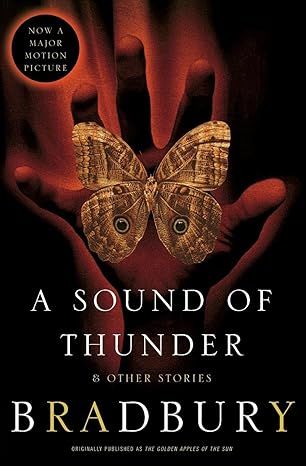
A Sound of Thunder and Other Stories
4.5
-
524
$13.09
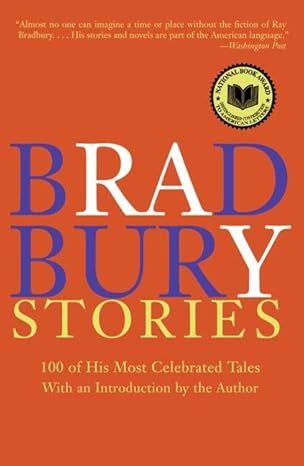
Bradbury Stories: 100 of His Most Celebrated Tales
4.7
-
1,363
$11.60
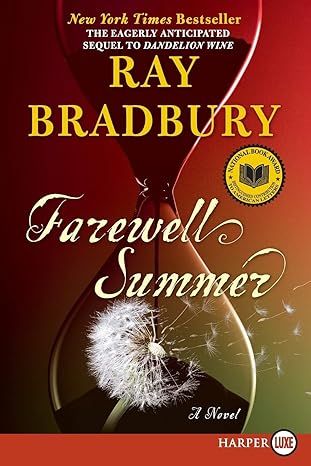
Farewell Summer
4.3
-
731
$0.99
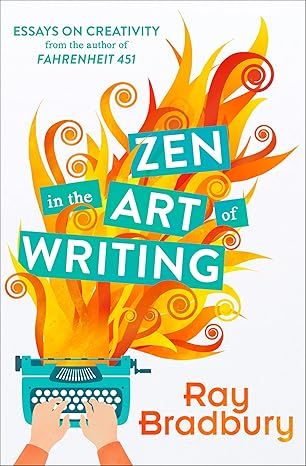
Zen in the Art of Writing
4.4
-
1,527
$14.33
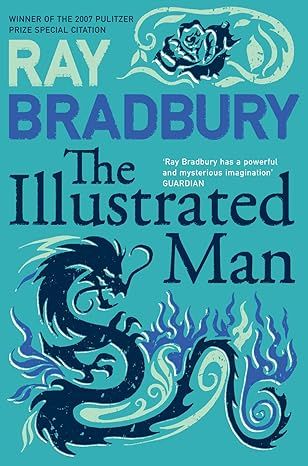
The Illustrated Man (Flamingo Modern Classics)
4.6
-
4,344
$9.31
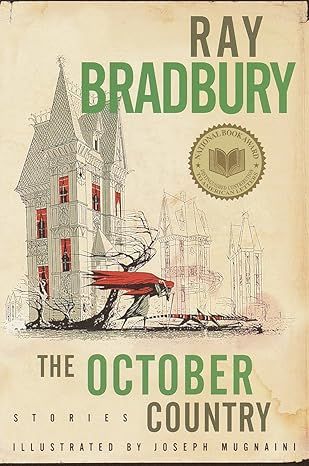
The October Country: Stories
4.6
-
1,736
$12.99
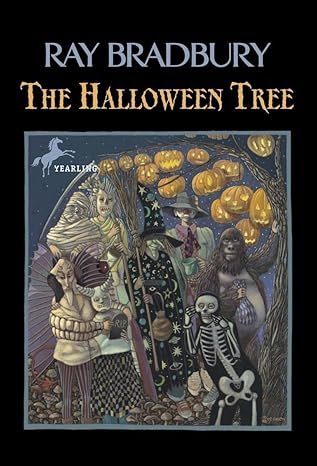
The Halloween Tree
4.6
-
3,112
$1.99
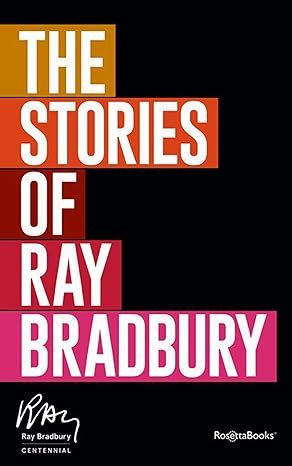
The Stories of Ray Bradbury: Introduction by Christopher Buckley (Everyman's Library Contemporary Classics Series)
4.7
-
1,003
$2.99

Dandelion Wine (English and French Edition)
4.5
-
3,529
$14.36
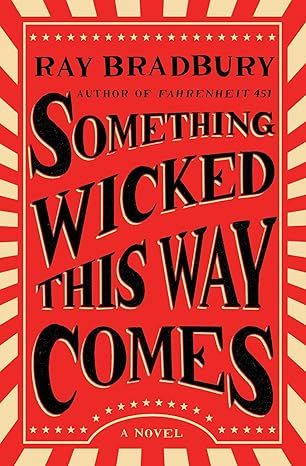
Something Wicked This Way Comes: A Novel
4.4
-
6,928
$0.99

Fahrenheit 451
4.6
-
52,920
$4.68
Best Sellers
View all
The Tuscan Child
4.2
-
100,022
$8.39

The Thursday Murder Club: A Novel (A Thursday Murder Club Mystery)
4.3
-
155,575
$6.33

Sapiens: A Brief History of Humankind
4.6
-
140,302
$13.49

The Butterfly Garden (The Collector, 1)
4.3
-
88,556
$9.59

Things We Hide from the Light (Knockemout Series, 2)
4.4
-
94,890
$11.66

The Last Thing He Told Me: A Novel
4.3
-
154,085
$2.99

The Perfect Marriage: A Completely Gripping Psychological Suspense
4.3
-
143,196
$9.47

The Coworker
4.1
-
80,003
$13.48

First Lie Wins: A Novel (Random House Large Print)
4.3
-
54,062
$14.99

Mile High (Windy City Series Book 1)
4.4
-
59,745
$16.19

Layla
4.2
-
107,613
$8.99

The Locked Door
4.4
-
94,673
$8.53
